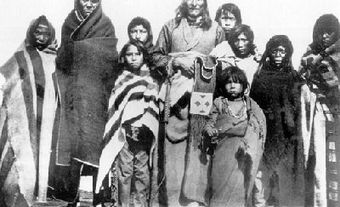Colonization Companies
Colonization companies were corporations designed to promote and co-ordinate immigration and settlement, employed at various times during Canada's history. Immigration and settlement were vital if the colony, and later the country, was to prosper. Colonization companies usually received blocks of land (eg, Huron Tract, Talbot Settlement) for reduced rates. They usually published brochures attracting potential settlers' attention, arranged for transportation to the block, helped settlers select land, provided (or helped them buy) equipment and seed for the first crop, and assisted with construction of homes. Once a group of settlers was established, the surrounding land would become more desirable to other settlers, and therefore more valuable to the company.
In 1627 the COMPAGNIE DES CENTS-ASSOCIÉS was founded to encourage permanent settlement in New France. It was granted a vast area in return for exclusive fur-trade rights, but was unsuccessful in its goals. The COMPAGNIE DES INDES OCCIDENTALES, founded 1664, assumed control of New France until 1674, when it reverted to the Crown. During the British regime, colonization companies such as the CANADA COMPANY in Upper Canada and the BRITISH AMERICAN LAND COMPANY in Lower Canada were formed to promote settlement.
By far the largest government-encouraged scheme, however, was the sale in the late 19th century of certain odd-numbered sections of land in the West to any business that demonstrated its goodwill and capabilities, and a sincere interest in promoting settlement. The measure was introduced by order-in-council 23 December 1881 as an amendment to the Dominion Lands Act of 1879 by John A. Macdonald's government, as an extension of its NATIONAL POLICY. The purchaser was required to locate 2 settlers upon each of the odd-and even-numbered sections of the tract within 5 years, although the Crown maintained exclusive ownership of the even-numbered sections. In return, the company was to receive a rebate of $160 for every newly established, bona fide settler within the colonization tract. Companies were expected to realize profits in proportion to the number of settlers they could induce onto their respective lands. With the maximum rebate, a company could pay as little as $1/acre for the odd-numbered sections. Once its even-numbered sections were fully occupied by HOMESTEADS or by pre-emptions, the company could demand $3-15/acre for odd-numbered sections.
The government wanted assistance in its DOMINION LANDS POLICY, and it hoped to sell 10 million acres (4.05 million ha) to private colonization corporations to recover $10 million of the $25 million it had pledged to the CANADIAN PACIFIC RAILWAY syndicate, and simultaneously to secure the business community's assistance in developing the western frontier. Importunate politicians, church groups and prominent businessmen petitioned the government for land, convinced that the North-West would be invaded by hordes of settlers. Most of their applications were withdrawn after the 1881-82 speculative real-estate boom on the Prairies collapsed. Of 260 applicants only 27 ratified contracts with the government, and the last of the companies involved was liquidated in 1891. After 1900, colonization companies, operating under the auspices of railway companies or the Department of Immigration, were much more successful in the West because of the massive influx of settlers and a great demand for land which lasted until WWI. Most of Canada's colonization companies, however, languished; several took no initiative, whereas others were victimized by adverse economic or political conditions, successive crop failures and poor communication with settlers on their tracts.

 Share on Facebook
Share on Facebook Share on X
Share on X Share by Email
Share by Email Share on Google Classroom
Share on Google Classroom


